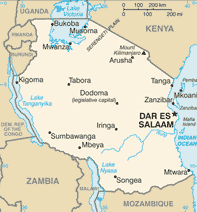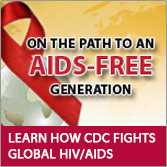Tanzania
Tanzania
- 5.0% Estimated HIV Prevalence (Age 15–49) (2013)
- 78,000 Estimated AIDS Deaths (2013)
- 1,300,000 Estimated Orphans due to AIDS (2013)
- 399,886 Reported Number of Adults Receiving Antiretroviral Therapy (ART)(2013)
- 68% Estimated ART Coverage per WHO 2010 Guidelines (2012)
SOURCE:
UNAIDS Gap Report, 2014; UNAIDS Global Report, 2013

Strategic Focus
CDC works with the Ministries of Health and Social Welfare (MOHSW) on the mainland and Zanzibar to support HIV testing, prevention, care and treatment services, and to strengthen health systems.
Scale-up of HIV Care and Treatment
Over the past decade, CDC has been instrumental in the scale-up of HIV care and treatment services in Tanzania. In 2004, CDC supported 11 care and treatment facilities in Tanzania and less than 5,000 people were receiving antiretroviral therapy (ART). By mid- 2014, CDC supported care and treatment services at 1,374 facilities (65 percent of all facilities nationwide) serving 354,908 people in care, including 265,891 adults and 19,786 children on ART.
Prevention of Mother-to-Child Transmission (PMTCT) Transition to Option B+
CDC is assisting the MOHSW to monitor the implementation of recent guidelines to offer ART to all HIV-positive pregnant and breastfeeding women regardless of CD4 count.
Scale-Up of Voluntary Medical Male Circumcision (VMMC)
CDC targets VMMC services among high risk populations in the fishing communities surrounding Lake Victoria.
Reaching Key Populations
CDC supports studies to understand the impact of HIV in people who inject drugs, female sex workers, and men who have sex with men. CDC supports testing, prevention, and linkage to care and treatment services for key populations.
Strengthening Public Health Systems
CDC supports laboratory capacity building in HIV and tuberculosis diagnosis, staging, monitoring, quality assurance, and early infant HIV diagnosis; training in epidemiology for physicians, health officers, laboratorians and others; and improved data collection and analysis to support planning.
Key Activities and Accomplishments
Human Resources for Health
Tanzania has a critical shortage of skilled health care workers (HCWs). CDC supports the MOHSW in increasing the number of qualified HCWs. In the past five years, CDC contributed to graduating over 1,000 new HCWs and 80 Master’s level epidemiologists through the Field Epidemiology and Laboratory Training Program. CDC has also been supporting the MOHSW to develop task shifting policy guidelines to ensure that workers at all levels, many of whom informally task shift now, have appropriate training and supervision.
Laboratories, Specimen Transportation and Provision of Results
CDC supported the establishment of the first National Health Laboratory in Tanzania and its Quality Assurance and Training Centre. With funding and technical assistance provided by CDC, four labs have been accredited to International Standards ISO15189, and 52 labs are now enrolled in the World Health Organization’s Strengthening Laboratory Management Toward Accreditation program. CDC supports the development of a national specimen transport and results feedback system through mapping testing facilities, creating hubs, and using motorbikes, couriers, and GSM/SMS printers. Fifty-two of 169 districts have been mapped to date. This system will be used for early infant HIV diagnosis, viral load testing, and outbreak investigations.
Success Stories
Contact Us:
- Centers for Disease Control and Prevention
1600 Clifton Rd
Atlanta, GA 30333 - 800-CDC-INFO
(800-232-4636)
TTY: (888) 232-6348
24 Hours/Every Day - cdcinfo@cdc.gov
 ShareCompartir
ShareCompartir



